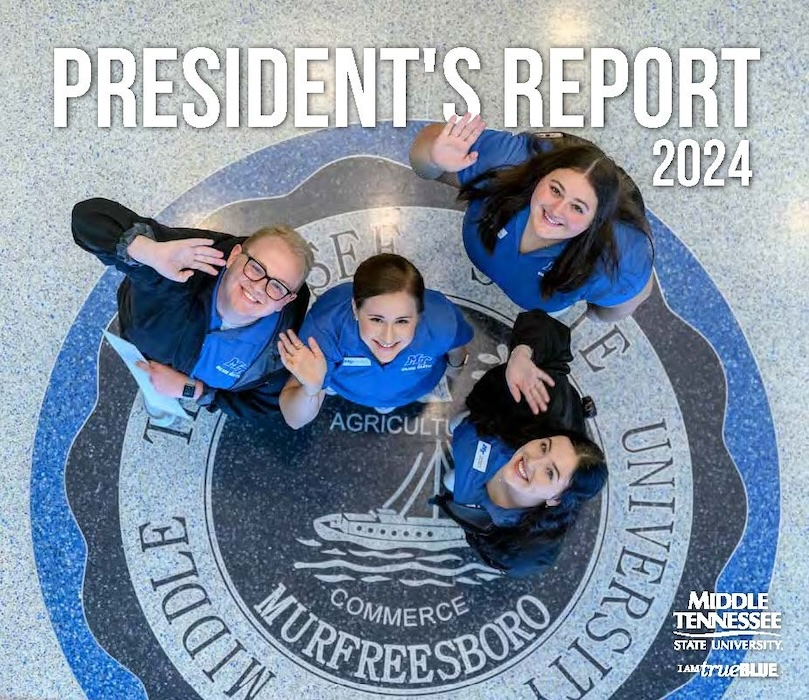A True New Era
| August 23, 2017
Filed Under: President's Post, Featured Articles
Everywhere I go these days, the No. 1 question I am asked is “How significant is the new governing board structure at MTSU?”

I think it is fair to say that the creation of the new board and our newfound independence as an institution is the second-most important event in the history of the University, behind our founding. This represents a true new era for MTSU, as well as an opportunity to invigorate and inspire the entire MTSU community about the impact this will have on our University.
The 10-member board stems from the FOCUS Act, championed by Gov. Bill Haslam and signed into law last year. The law established local governing boards for MTSU and the other five former Tennessee Board of Regents (TBR) universities. The state’s creation of individual governing boards was the next logical step in better aligning our postsecondary education system to ensure Tennessee reaches its Drive to 55, a goal to have 55 percent of residents with a postsecondary degree or credential by 2025.
Formal oversight of MTSU shifted from the TBR to the local Board of Trustees after our new governance board met for its inaugural session in April. Joined by Gov. Haslam and with faculty, staff, and community members on hand, I was honored to convene the group for the first time inside the Student Union Ballroom and to call that historic meeting to order.
In his remarks, Gov. Haslam reminded our trustees that MTSU remains a vital part of the larger state higher education system, yet the new local structure will allow greater latitude in setting our own strategic priorities and lets each institution play to its strengths. Haslam also commented that one of the most critical responsibilities for the MTSU Board was its singular focus on the University, and that in nominating potential board members he was looking for men and women who got up each day thinking about ways to make MTSU better.
When you are part of a diverse system like we were with the TBR, it’s simply impossible for board members to have that type of focus and commitment to the needs of a single campus. With six universities, 13 community colleges, and 27 colleges of applied technology, the TBR had to consider a vast array of differences in needs, missions, and student demographics. Decisions were often focused on the larger general needs of the entire group. As such, the TBR was not always capable of addressing the unique needs of our campus.
In looking at our new, independent board, I find it very comforting that almost all of our members have some history and experience with our campus. We have several alumni on the board, as well as representatives of some of the state’s leading corporations who have been involved with MTSU for many years. They know the University and understand the important role MTSU plays in educating Tennesseans. Also, and I think this is important, they have a sense of what MTSU can become.
It’s a little too early to talk about specific actions; but, as we move forward with this new form of governance, and as our board gains an even deeper understanding of our great institution, I believe you will see them begin to help shape our mission and identify new opportunities that will complement the quality programs and activities we have on our campus.
While I think it’s safe to say that we’re going to see some new directions and changes over time, I’m confident that our board understands that our first and most important priority will always be our students and providing them with the support and skills they need to be successful. MTSU has been recognized as the state’s top comprehensive university, and our board is committed to maintaining that status.
What changes if any will people see quickly? Without question, one of the most immediate changes our students and faculty will note will be the speed with which certain things get accomplished. Being able to address issues here on campus allows us to be more responsive and timely in our decision-making. In addition, having our own board will help remove one layer of bureaucracy, since we’ve transferred some of the decisions formerly made at TBR to our campus.
One unknown in all of this is how this change will affect higher education funding and support from the state. Gov. Haslam has been very clear that he doesn’t expect this to become a “free-for-all” with the legislature. However, there undoubtedly will be some competition among our universities as everyone seeks what’s best for their institution. We’re very fortunate that the Tennessee General Assembly has long recognized the important role that MTSU plays in our state’s higher education system, but we will have to expand our efforts in educating the legislature and keeping our needs in front of them. I expect our new board will play a critical role in assisting us in that area.
In the end, I believe this new level of independence for the former TBR universities is truly bold and potentially transformational for MTSU. I look forward to learning and exploring the opportunities it could provide toward our mission of ensuring student success and providing more graduates for the state’s workforce.



